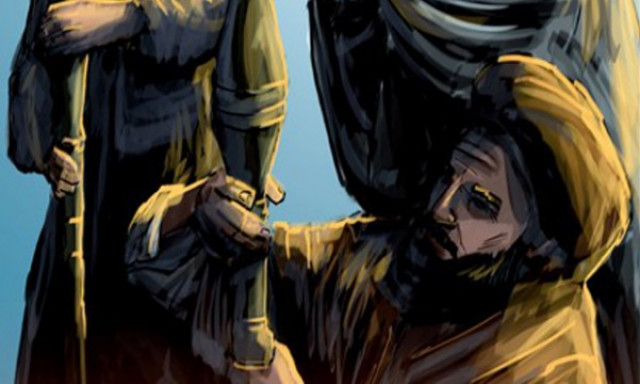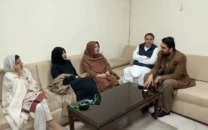Punjabi Taliban: I pretend, therefore they don’t exist

Some of them were of a more generic outfit, customized and tailored by the Pakistan Army to fight a proxy war, a policy which was revealed to be flawed only few decades later.
Yet others had more specific agendas, sponsored and aided and often accepted within the mainstream polity. These included those who would hunt down and kill anyone of a different faction at will.
I said that today it seems like an absurdity because many of us continue to shy away from admitting this past, while opting to appear more tolerant and progressive. Today too, we pretend to look away from the existence, albeit underground, of these very organizations which were once a stark reality and operational throughout the nation.
What bothers me is not that these organizations still exist. It is quite obvious that an ideology that has been fed and supported by certain powerful stakeholders would not diminish within a few years of policy change.
What does bother me is whether a policy change has actually occurred, and if so, has it been implemented or is it, just like many other policy announcements, mere rhetoric? For despite the fact that such organizations are banned officially, the reality is that they do exist and recruit personnel openly and have madrassahs under their control which act as their centers.
South Punjab is particularly ripe for them, where factors like economic disparity, low literacy rate and remoteness from the provincial command act as facilitators in providing ground to such militant factions.
The performance of the Punjab government suggests that its intelligence is poor in the region. Another worrisome possibility is that government officials are not willing to take a go at these extremists. This doesn’t come as a surprise since years of intense grass-root work and faith-based funding has lent these organizations immense power, in terms of influence, resources and knowledge about local culture and terrain as well as manpower.
From the way Punjab government is handling the situation, and from the past record of the Chief Minister’s statements, it seems the PML-N prefers sustaining a vote bank to battling extremism. It has long pretended the non-existence of any such dangerous elements, but those statements have paled next to more substantial proofs coming forth about the role of Punjab-based Taliban in the recent saga of manslaughter at Lahore.
This denial on the part of the provincial command has truly complicated the entire situation. Had they accepted this fact and moved on with a counter-strategy to thwart these elements from their safe havens and take effective steps in containing their terror assaults, it would have been relatively smooth sailing. Now, however, military solutions are being proposed, which are certainly not the ideal way to address the situation.
Talking of the possibility of a military solution for the Punjab-based Taliban, one must not forget that any sort of military assault in these regions may severely disrupt normal life throughout Punjab. Also, a singularly military solution shall stir other sleeping dragons; the yesterday’s proxy guys whom we dumped after using for years, who surely hold a grudge against the army. And that shall leave Lahore most vulnerable, with the recent incident vividly depicting the reach of these elements well within the heart of Punjab.
Looking at all this, the very first step that we need now is to admit the presence of such radicals within our ranks. And by ‘us’, I mean society more so than the government, for the masses at large put a finger on CIA and RAW more often than the Taliban in the aftermath of any terrorist attack.
Media, an effective tool in shaping the public mindset and orienting the commonplace social discussions, has been playing a rather poor role. It needs to realize the gravity of the situation before it is too late. It can be a great aide in rooting out the support these militant factions enjoy among the local masses.
Once this is done, a parallel low-level counter-terrorism strategy may be implemented through law-enforcement agencies rather than the army. It will be slow, and slow it has to be, for what we sowed and backed for decades will take years to erode out, and that too only when we truly try.
Salman Latif is interested in intellectual discourse towards everything that crosses his mind. He maintains a blog at ‘Tis My Say and actively tweets.



















COMMENTS
Comments are moderated and generally will be posted if they are on-topic and not abusive.
For more information, please see our Comments FAQ